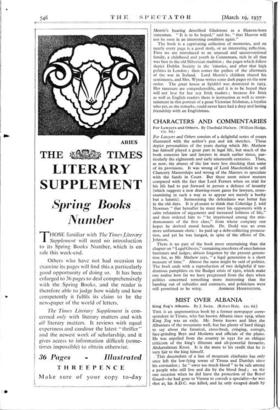A GREAT IRISHMAN
An Irishman and His Family. By Maude Wynne. (John Murray. res. 6d.) IF in a Victorian childhood in Ireland one's elders had a name to conjure with, it was that of Lord Morris, the subject of this memoir by his daughter, a lawyer famed for his mental power and physical energy, his wit and his robust opinions. In a sense Morris embodied in his own person the Unionist faith, for there was a man, outdoing all the patriots in the Irishness of his temperament and personality, a Catholic too, whose career, as honourable as it was successful, seemed to demonstrate the unreality of most of the Nationalist complaint at West- minster. In 1887 he became the first Catholic Lord. Chief Justice of 'Ireland, and then a Lord of Appeal ; and his successes were achieved .without any truckling to Protestants and Ertglishry, on the one hand (he even exag4erated the accent of the Connemara wilds whence he came), and, on the other. without any hesitation in the conservative opinions which he had imbibed from his father, the first Catholic High Sheriff of Galway, and from the friend of his youth who warned him : "Mind you, Michael, any change, however beneficial, is to be deplored." His daughter recalls many of the witticism', which once were invariably quoted at Dublin dinner-tables whenever public affairs were under discussion. Someone in
Morris's hearing described Gladstone as a Heaven-horn statesman. "It is to be hoped," said he, "that Heaven will not be soon in an interesting condition again."
The book is a captivating collection of memories, and on nearly every page is a good storY, or an interesting reflection. First we are introduced to an unusual and unconventional family, a childhood and youth in Connemara, rich in all that was best in the old Hibernian tradition ; the pages which follow. depict Dublin Society in the 'nineties, and after that high politics in London ; then comes the pathos of the aftermath of the war in Ireland. Lord Morris's children shared his sentiments, and Mrs. Wynne writes some dark pages on the new order. The great house at Spiddal was destroyed in 1923. Her rancours are comprehensible, and it is to be hoped they will not lOse for her any Irish readers ; because for Irish as well as English readers there is instruction as well as enter- tainment in this portrait of a great Victorian Irishman, a loyalist who yet, as she remarks, could never have had a deep and lasting friendship with an Englishman.





































































 Previous page
Previous page